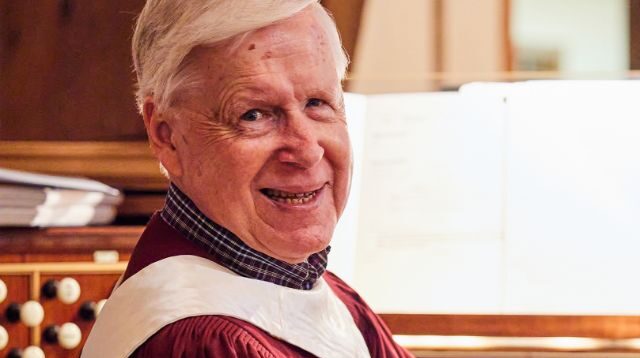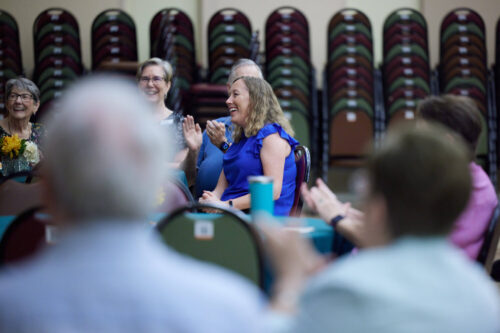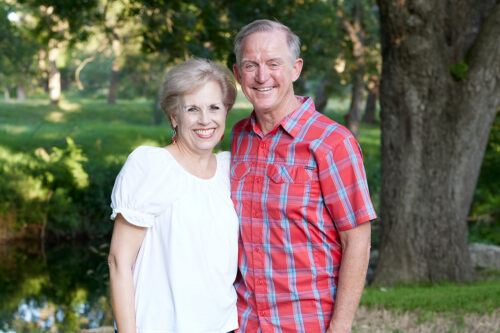
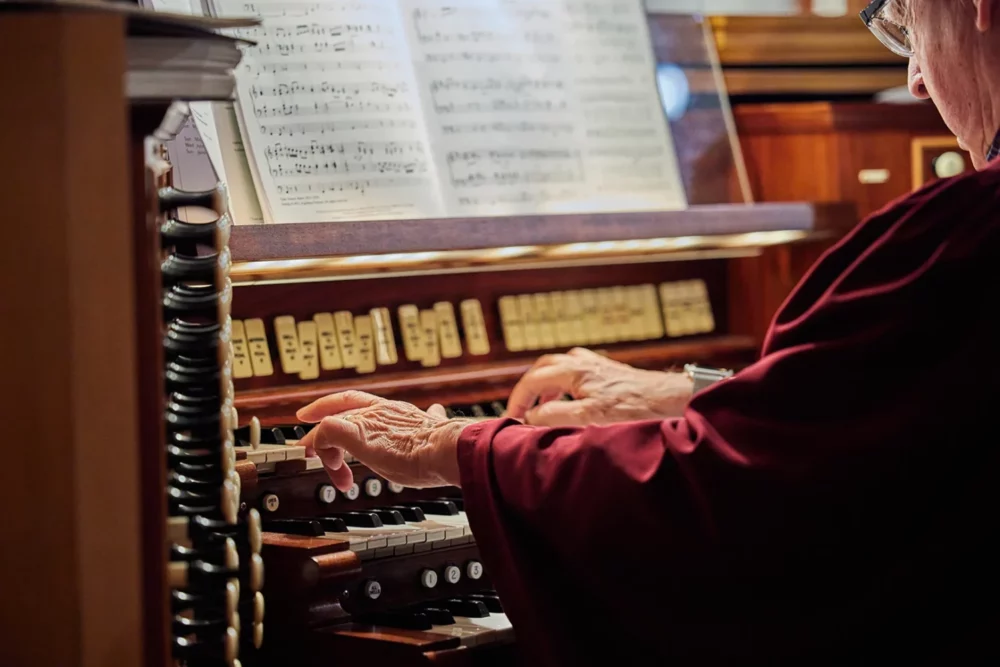
Celebrating John Schmidt’s 24 Years as Covenant Organist
When John Schmidt saw the flyer announcing the need for an organist at Covenant Presbyterian Church in August 1998, he thought, “Why not?” He gave then-Director of Worship Tom Brown a call, they met for lunch and, said John, “It was like we’d known each other all of our lives.”
Though John’s official Covenant start date was in October, he played most Sundays in September that year. He had his “conditional Sunday” on Labor Day, and agreed to be the substitute organist for two more Sundays that month.
Now nearly 24 years later, John is appreciative of his time at Covenant. “I always liked what was going on music-wise. Covenant has a strong choir and nice people in the choir,” he said. “The choir has always been a very large small group. The members are so supportive of everyone and Tom was a good minister. At the end of rehearsals, we’d always share our concerns; we’d pray and offer praises.”
John’s experience was helpful when current Worship Director Michael Shuman started. “Having someone who has such a vast knowledge of church music, both choral and organ, as well as a history with the congregation is wonderful,” Michael said. “He helped acclimate me to the rhythms of the church and choir. He was an asset for the various nuances that I might not pick up on without really getting to know individuals or service routines,”
Michael added, “I can ask him anything or talk about so many subjects and he’s able to talk about it all.”
“He’s a consummate musician,” said long-time choir member and friend, Marijean Tritle. “He has special ears. Many times during choir rehearsal he would hear a section that was having a little difficulty, and would thump out that particular part. If he heard the basses were having trouble, he’d pound out the bass section a little bit harder. I was an alto, and very frequently, it would be our part. All of the sudden, we could hear that he was worried about us,” Marijean said.
Choir member Suzanne McFarlane agreed. “John is like the North Star for the choir,” she said. “He’s very quietly just ’there,’ playing the notes that the singers need to hear, sounding a pitch before it is even asked for because he knows a section isn’t finding the note. He had the psychic ability to know where the director was going to return to for extra work before it was even spoken.”
“He’s just a special caring individual. John has been an extraordinarily wonderful person, organist and friend through the years. He and Jacque were a super addition to our choir family back in the day and every day that they’ve been there,” Marijean said.
Thanks for (the Silly) Memories
_copy.jpg)
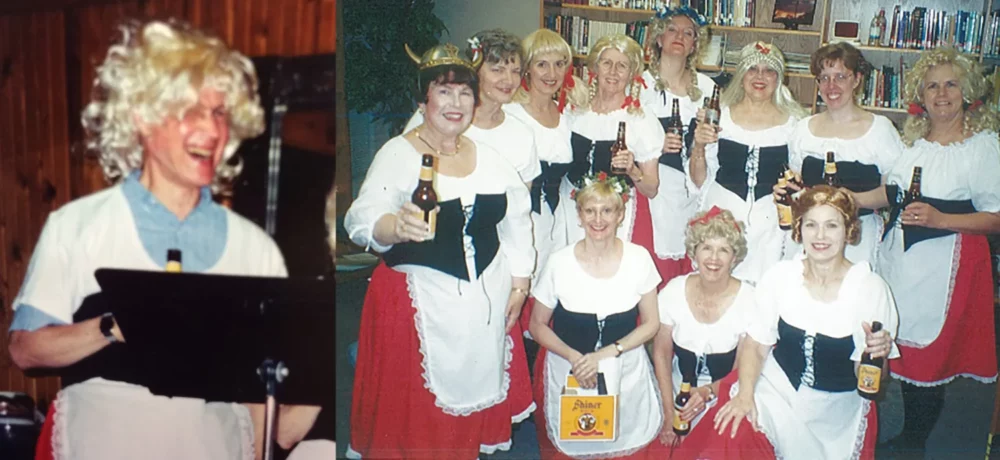
John’s time with the choirs is filled with many happy memories. “We used to have choir retreats that would last a whole weekend. We’d do silly stuff! We’d hold talent shows,” John said, and then asked, “Have you heard about the Beer Bottle Babes?”
Ah, no …?
“The Beer Bottle Babes were our ‘Bock’ Choir. We had to have Shiner Bock bottles, and they had to be emptied. We’d fill them with water; we even arranged sheet music. I think there’s a picture of me with wool on my head to look like a white wig. Some of the choir members would play the bottles — I can’t remember if they blew in them or hit them!”
The Beer Bottle Babes made quite an impression. “John was quite willing to step out and do some funny things at retreats,” recalled Marijean. “The altos had a group; we would put on a skit — the Beer Bottle Babes. We played the beer bottles. We blew on them and made music. At one point, John and Tom thought it would be a good idea to don the Beer Bottle Babe outfit — a skirt, apron and a braided wig — and play with us. The only problem was that they were the really good musicians; the Beer Bottle Babes were just glad if we blew our note. John and Tom were a little more precise in their timing.”
(Of course they were!)
John and Tom would get the chance to show their amazing musicality at these talent shows. The two would often play piano duets—marches, rag time, Broadway show tunes and more.
A Musical Life

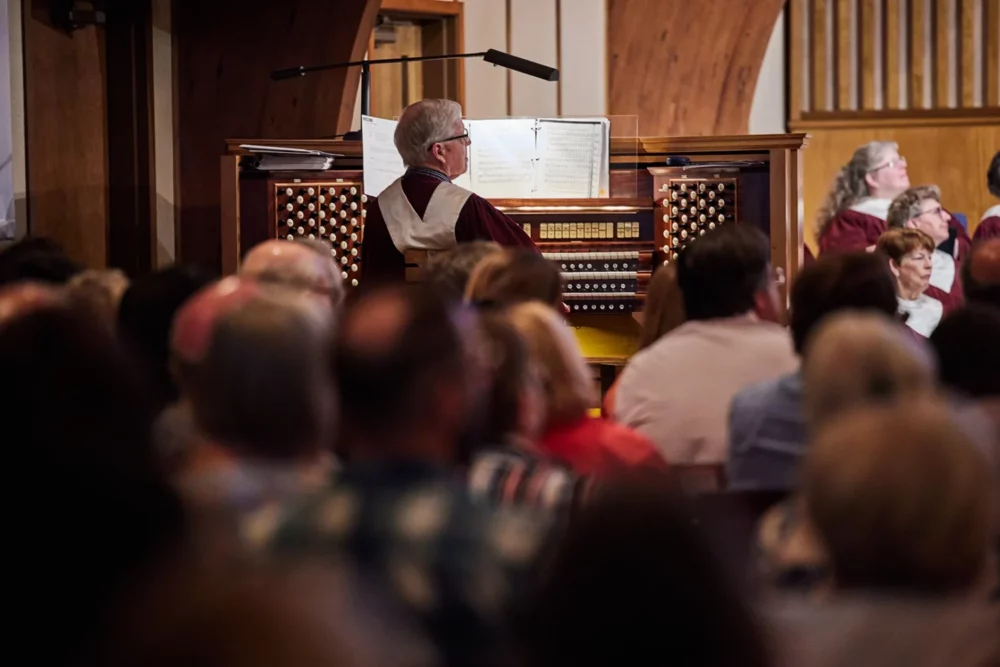
Music is a way of life for John. For 46 years, he taught music theory, music history and organ at Texas State University in San Marcos. Before he even hit double digits, he was playing the piano for church services.
“When I was little, we lived in a little town about 100 miles up the Hudson from New York City. My father was a Methodist pastor and he had four churches. On Sundays, he would preach twice in the morning and twice in the afternoon. The last service was at a tiny place out in the woods. Whoever had played (piano) there quit so my mother got prevailed upon to play services, and so she prevailed upon me.”
John was a natural; his ability to read music enabled him to easily handle his new worship responsibilities. “I love sight reading,” he said. “Back then, I would sit at the piano and start with the first hymn and play through the hymnal.”
John was so good that he soon was (quite proudly) playing weddings. “I played for my first wedding when I was about eight. My folks got me a new white suit. I was hot stuff!”
After John’s family moved back to Texas (He is a fifth generation Texan), his love of music eventually led him to Southwestern University in Georgetown, where he received his Bachelor of Music degree. Upon graduation, he returned to New York. “Anyone in an area of music that could potentially be church music was encouraged to go to Union Theological Seminary in New York,” John said. “They had a master of sacred music until the late ’70s. At the time, it was the place to go for church music.”
Upon graduation and back in Texas John decided he didn’t have the skills to be a choral person at the level he wanted to achieve. He decided to pursue another option — university teaching. He was accepted at New York University where he began work on a Ph.D. in musicology. He spent the next decade writing his dissertation on the 19th-century American composer John Knowles Paine. At one point, John said, his advisors told him to limit his research. John ignored the suggestion and finished a 750-page dissertation.
“That dissertation is what really established me,” John said. He explained that his dissertation was was selected to be published as a book. He subsequently published numerous articles on Paine, and has also researched and written about the music of 19th century Germans in Texas.
John ended his Texas State career as a full professor, and recently learned that he has been designated a distinguished professor emeritus. He’ll be recognized at Texas State in the fall.
The Organ: King of Instruments

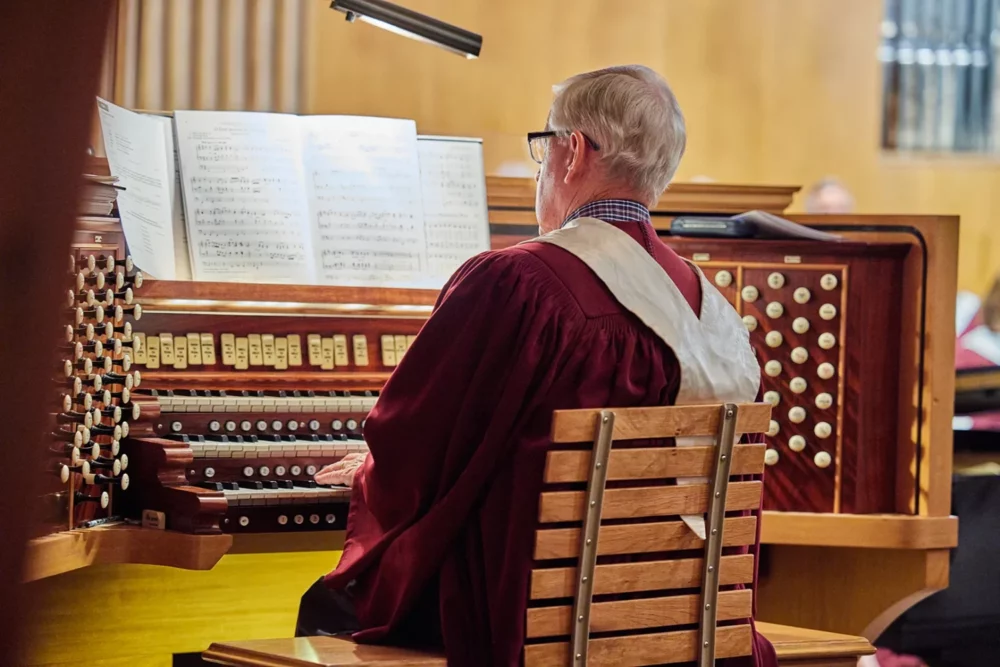
When asked what has changed with organ music during John’s long tenure behind the keys, he said human playing has gotten better. “I’ve learned to communicate better doing hymns than when I first started out. I feel like I can express the words better and communicate with what the congregation is doing.
“I love playing hymns here; the people really sing! And this morning, oh wow! They were really singing plus the choir is a big help. The choir is so close and the pews are so close too. I can hear so many voices.”
John believes the organ is unique in its ability to help lead singing. “There is something acoustical about the resonance of a pipe organ that can help lead singing. It’s a true sound as opposed to something that is derisive. Mozart called it the king of instruments. You can get such variety from it. The piano is basically one sound. The organ is anything from very soft to thunderous.”
John recalled a time he played with the Southwest Texas Orchestra. “Saint-Saëns wrote an organ symphony that ends with a gigantic C major chord. I played the lowest note on the organ — a huge C major and I was drowning out the orchestra.”
No matter the venue, John’s prowess at the organ will be missed. “The thing that I will miss the most, my favorite thing, is John playing Widor’s Toccata,” Marijean said. “It is a magnificent piece, and every once in a while he will stick it at the end of a worship service for a postlude. He’s such a special musician and he plays it so well. The piece involves not only multiple keyboards on the the organ, your feet are also involved. He has special shoes to play the low notes with his feet. Just to be able to play with your hands is great, but adding the feet is something to behold!”
Marijean continued, “I’ll not get to hear him play that anymore. That makes tears come to my eyes.
“He just does special things, like when he played the Ukrainian anthem as a postlude. I admire the careful way he selects music to fit the occasion. He is the consummate musician, always taking special care to make sure what he is doing is appropriate and meaningful.”
Retirement: Future “Pew Sitter”

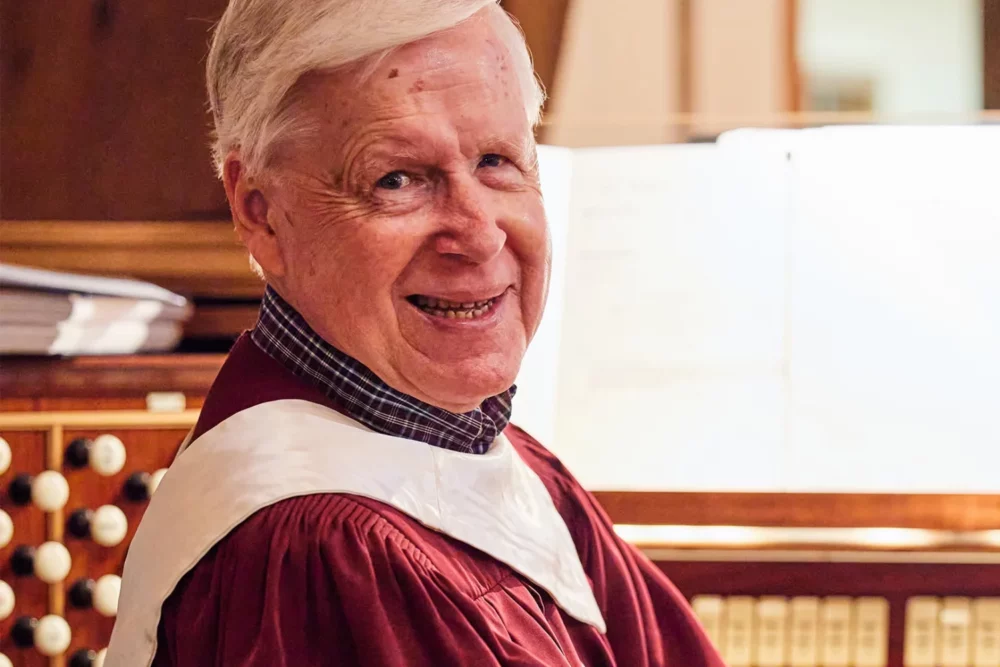
Though many things fell into place to set John up for Covenant retirement this year, he joked about the reason he stayed so long. “Tom Brown said I couldn’t leave until he retired.”
In reality, John recently retired from Texas State (though he still teaches a few organists), and he and Jacque moved to Boerne, increasing the already long Covenant commute to two hours. John’s sister Ruth, also a choir member, lives in the area. John and Jacque drive to Austin on Saturday and spend the night. After Sunday worship, they have lunch and hit the road.
This week, the couple came Wednesday to rehearse for the Sunday afternoon choir performance. They’ll stick around for the afternoon concert and a choir party, and hit the road on Monday morning. The last commute will be bittersweet, driving away from 24 years of organ playing, and a weekly visit with family and friends too numerous to count. Still, John is looking forward to Sunday mornings.
“Ever since I graduated from college in 1961, I’ve had an ongoing weekly Sunday commitment.
I’m looking forward to being a local pew sitter,” he said.
“For heaven’s sake, of course we will miss him!” Marijean said. “We’re missing him already and he’s not even gone. It was not only that he and Jacque were a part of the music department at Covenant, they were generous and loving people of the community.”
“What we will all miss the most about his retirement is John and Jacque’s presence among us,” Suzanne said. “They have driven in from San Marcos to be with us twice a week for over 20 years. That’s real dedication. They both deserve a well-earned retirement, and we all wish them many happy years going forward.”

